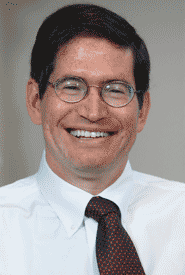At an event commemorating the signing of the U.S. Constitution, Harvard Law School Professor Michael Klarman, an expert on constitutional law and constitutional history, gave a lecture entitled “Why the Tea Party Has It Wrong: The Story of a Multifaceted Founding”.
“We have a tendency today to venerate the Constitution and to revere the founders almost to the extent of deifying them,” said Klarman. “I think that’s actually an insidious tendency, and I want to try to poke a few holes in it, maybe deflate the idea of the founders as Gods.”
The Sept. 19 event, sponsored by the HLS American Constitution Society, was held to mark Constitution Day – an annual, national celebration of the signing of the U.S. Constitution on Sept. 17, 1787.
Klarman based his lecture on a book he is currently writing for Oxford University Press’s “Inalienable Rights” series on the founding of the United States. His lecture, divided roughly into five sections, debunked myths many hold about the Constitution and founding fathers, and addressed how the Constitution is applied (or isn’t applied) today.
Reflecting on the Constitution’s creation, Klarman stated, “In sum, the Constitution provided for far less democracy at the federal level then most Americans had become accustomed to at the state level by the 1780’s. In addition, it was ratified in a process that was stacked against democratic deliberation. It’s not obvious why we should want today to pay blind obeisance to a Constitution that was adapted in that way and with those substantive provisions.”
Later in his talk Klarman noted that many of the freedoms that we have come to take for granted today do not stem from the Constitution, but from the American people as a whole as we have progressed as a nation. He also noted that certain elements which the founding fathers placed in the democratic construct have not necessarily held up over time, including limited executive power and the power of the Congress.
“The framers thought Congress would actually legislate, strange idea,” he joked with the crowd. “Instead Congress passes meaningless vague statutes, which are simply turned over to administrative agencies and courts to fill in the gaps within.”
The Kirkland & Ellis Professor of Law, Klarman is the author of many books, including most recently: “From the Closet to the Altar: Courts, Backlash, and the Struggle for Same-Sex Marriage” (Oxford University Press, October 2012) and “The Political Heart of Criminal Procedure: Essays on Themes of William J. Stuntz,” with David Skeel and Carol Steiker (Cambridge University Press 2012).
The American Constitution Society for Law and Policy (ACS) is one of the nation’s leading progressive legal organizations. Founded in 2001, ACS is comprised of law students, lawyers, scholars, judges, policymakers, activists and other concerned individuals who are working to ensure that the fundamental principles of human dignity, individual rights and liberties, genuine equality, and access to justice are in their rightful, central place in American law. For more information visit their website.
